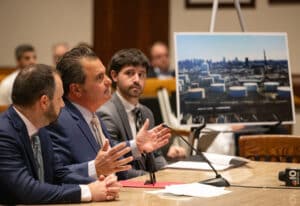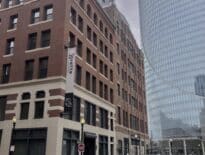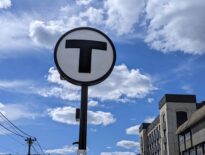
Everett Mayor Carlo DeMaria speaks to the Joint Economic Development Committee on Tuesday, April 2, 2024 in support of a bill that would open up an Everett parcel for construction of a pro soccer stadium. Photo by Sam Doran | State House News Service
The effort to develop a pro soccer stadium in Everett drew praise Tuesday from city and state officials, who urged a legislative committee to advance a key zoning change for a blighted land parcel on the Mystic River and to make up for decades of environmental problems that have plagued the community.
But during a Joint Committee on Economic Development and Emerging Technologies hearing, a Boston city councilor warned a new stadium – situated on the Boston-Everett line – could cause traffic nightmares, and pleaded for the city to be included in future planning discussions. An environmental advocacy organization also said it “wholeheartedly” opposes the latest bill filed by Sen. Sal DiDomenico of Everett in December, attempting to facilitate a new home for the Revs.
DiDomenico’s bill (S.2692) would remove a 43-acre parcel of land situated partly in Boston and Everett from its “designated port area” status “for the purpose of converting the parcel into a professional soccer stadium and a waterfront park.”
The House and Senate have each previously endorsed language aimed at sparking construction of a future home for Robert Kraft’s New England Revolution in Greater Boston, and the coming months offer a chance to see if they can find consensus.
Supporters: Clean-Up Needs Funding
“What we have today is an opportunity to right the wrongs of the past. Our community has been burdened by heavy industry, for the entire region to benefit, at the expense of my residents in the city of Everett,” said DiDomenico, who added city residents have developed cancer at the expense of companies that left behind contaminated brownfield properties.
DiDomenico’s bill is seen by supporters as a necessary step in a multi-year permitting effort, as the project would also require environmental and transportation reviews from the state, plus local zoning approval.
Wynn Resorts purchased the site several years ago with the goal of helping with a “positive transition from this disastrous environmental situation,” said Chris Gordon, president of the company’s development arm. Part of the power plant stopped operating in the 1950s, with the last unit shutting down in 2021, he said. A second, gas-powered generation plant still operates next door.
“We have no plans to develop it. We have no plans to remediate it, and we do not plan to invest any more money,” he said. “It is likely to sit there idle for years to come, blocking the economic development and reputational benefits that Everett has long pursued.”
Boston Officials Fear ‘Nightmare’ Traffic
Boston’s planning chief James Arthur Jemison said the city does not have sufficient information to comment in favor or opposition of the plan. Jemison said Boston must have a seat at the table to understand potential impacts on residents, including transportation and climate factors.
The scope of the project was outlined in a November document. DiDomenico is listed as a “third-party overseer” in the memorandum of agreement between Everett and NRS, LLC, a Kraft Group entity.
The signed document calls for a “world-class stadium” with about 25,000 seats at 173 Alford Street, plus an “enticing public park” on the waterfront. There would only be 75 on-site parking spots, and NRS would study improving pedestrian infrastructure to encourage public transportation use.

During a legislative hearing on Tuesday, April 2, 2024, The Kraft Group shared a rendering of a potential new stadium in Everett for the New England Revolution. The team currently plays at Gillette Stadium in Foxborough. Image courtesy of The Kraft Group
The stadium’s capacity would exceed TD Garden, which has 19,600 seats, and and sits only about 2.5 miles away.
Boston City Councilor Sharon Durkan, whose district includes Fenway Park and TD Garden, raised concerns about the parking plan, warning the foot traffic to the Everett stadium would be most heavily felt in Boston. The project would require additional investment from the MBTA, since the closest train stop is about a mile away in Sullivan Square, she said.
Durkan, echoing Jemison and previous concerns raised by Boston Mayor Michelle Wu, said the city must be included in future planning conversations.
“If there were simultaneous events both at the Garden and the stadium, it would be a nightmare for traffic,” including on the northern part of the commuter rail, she said.
Conservationists Argue Port Still Needed
Maggie Sullivan, senior attorney at the Conservation Law Foundation, said the group opposes DiDomenico’s bill and called “spot zoning” – or carveouts for zoning rules for one specific land parcel or developer – “bad planning.”
Sullivan said CLF does not oppose Everett’s hopes for a soccer stadium, but she warned that removing one of the state’s 10 working ports with deep-water access could harm the state’s clean energy goals. Traffic congestion on game days could also increase air pollution in Somerville, Everett and Boston, she said.
The Legislature should be cautious about “shrinking our port footprint and undermining our clean energy goals, and make sure any stadium is one that fans can actually get to and that neighboring communities embrace without regret,” Sullivan said.
DiDomenico later said there’s been robust engagement with the environmental community about the project, including with CLF. Not all groups chose to participate as the community benefits agreement was being drafted between Everett and the Kraft Group, he indicated.
“So I want to implore all of you and others to understand that the outreach in the community was done in a very thorough way,” DiDomenico told the committee.
Committee Co-Chair Reactions Split
Committee co-chair Sen. Barry Finegold signaled his support for the bill after the hearing.
“I think that there was some really good testimony. I think that there was a strong case made to move the bill forward, and I’m hopeful that that’s what this committee will do,” Finegold told reporters. “I think there’s a lot of ample reason to move forward but we just kind of want to reflect on what we’ve seen today and do our homework on our end, as well.”
Committee co-chair Rep. Jerry Parisella, asked whether he supports the bill, told reporters that he’s “still looking at it.”
Parisella said his focus at the hearing was ensuring the proposal enables “robust public input,” including from surrounding communities. The bill may be adjusted to explicitly ensure input from Boston, Parisella said.

Sen. Barry Finegold and Rep. Jerry Parisella, co-chairs of the Joint Economic Development Committee, pore over design renderings of the New England Revolution stadium proposed for an Everett property at a hearing on April 2, 2024. Photo by Sam Doran | State House News Service
“I do think that there’s some compelling arguments about what would happen otherwise if we don’t allow a stadium to be built,” he said. “We know that there are a lot of environmental issues related to that site.”
Language facilitating construction of an Everett stadium won House approval in an economic development in mid-July 2022, but Senate negotiators did not agree to it as part of a compromise bill.
Then in 2023, the Senate incorporated similar language into a supplemental spending bill to pave the way for a stadium. But that provision didn’t make it into the conference committee report following closed-door House-Senate negotiations, and revelations over the MOA involving DiDomenico may have scrambled a possible deal.
Under an extension order approved by the House and Senate, the committee has until May 30 to make a decision about the latest bill.




 |
| 

